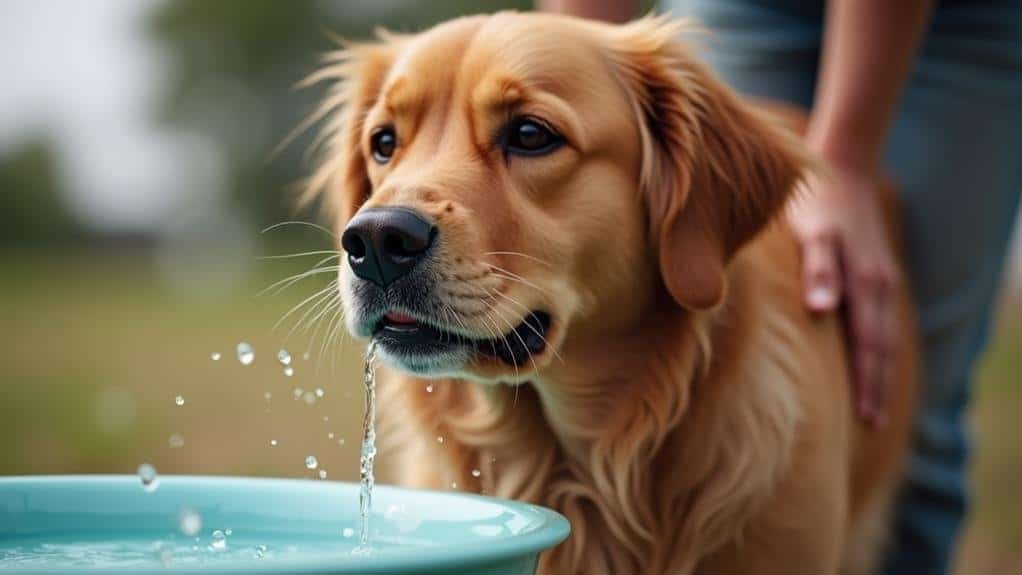Your dog's coughing after drinking water is often harmless, typically caused by drinking too quickly or minor throat irritation. However, persistent coughing could signal underlying issues like kennel cough or tracheal collapse. Dogs have a unique throat anatomy that makes them more susceptible to respiratory problems. To help prevent coughing, encourage slower drinking with specialized bowls and offer water in smaller amounts. Keep an eye on the frequency and duration of coughing episodes, and consult a vet if the problem persists or worsens. Understanding the causes and prevention strategies can help you better manage your dog's health and comfort.
Common Causes of Coughing
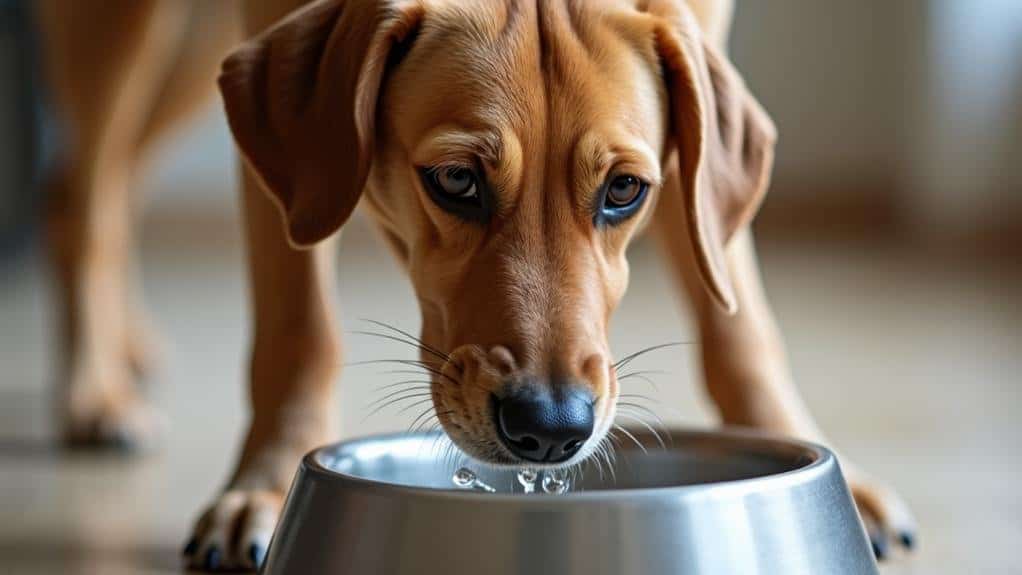
Five common causes can lead to your dog coughing after drinking water. The most frequent reason is simply drinking too quickly, causing water to enter the trachea and triggering a reflexive cough. This usually resolves quickly and isn't a cause for concern.
However, persistent coughing after drinking may indicate underlying health issues. Kennel cough, a highly contagious respiratory infection, can cause coughing fits triggered by drinking.
Tracheal collapse, more common in small breeds, weakens the windpipe and can lead to coughing when drinking. Allergies and environmental irritants may also cause throat irritation, resulting in coughing after water consumption.
Chronic bronchitis is another potential culprit, as airway inflammation and increased mucus production can exacerbate coughing when your dog drinks.
It's essential to monitor the frequency and severity of these coughing episodes. If you notice persistent coughing or other concerning symptoms, it's time for a veterinary evaluation.
Your vet can determine if there's an underlying respiratory issue or other health problem causing the coughing and recommend appropriate treatment to keep your furry friend comfortable and healthy.
Anatomy of a Dog's Throat
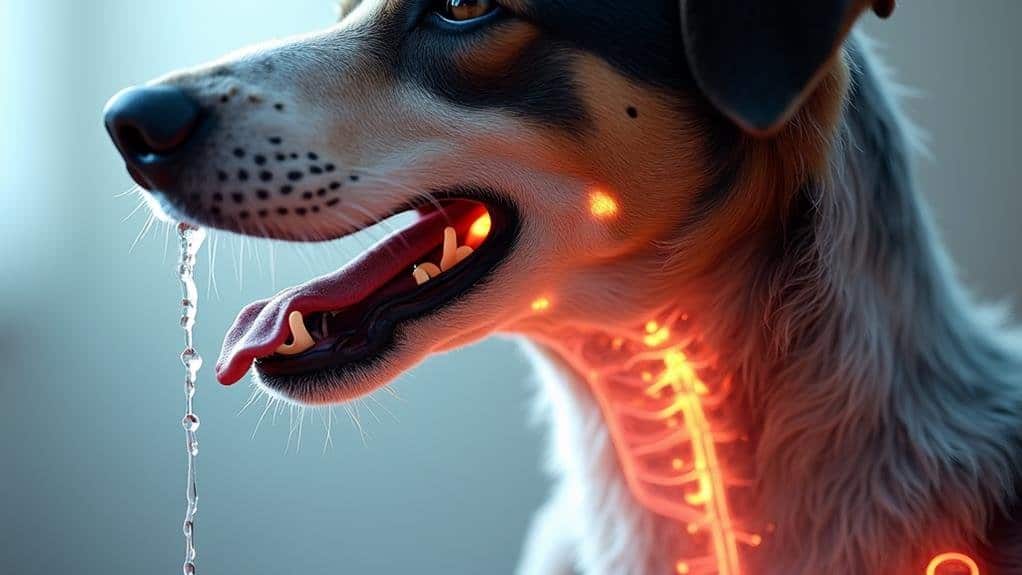
To understand why dogs cough after drinking water, it's important to examine the anatomy of their throat. Your dog's throat, or pharynx, connects the mouth and nasal passages to the esophagus and trachea, playing a vital role in both respiration and digestion.
The trachea, made of cartilage rings and smooth muscle, extends from the larynx to the lungs, ensuring a clear airway for breathing.
A key component in preventing coughing in dogs is the epiglottis, a flap of tissue at the base of the tongue. It acts as a protective barrier, preventing food and water from entering the trachea during swallowing.
However, dogs have a relatively short and wide trachea compared to humans, making them more susceptible to respiratory conditions like collapsing trachea, especially in small breed dogs.
Understanding this anatomy helps explain why some dogs may cough after drinking water. If the epiglottis doesn't fully close or if water enters the airway too quickly, it can trigger a coughing reflex.
This is particularly common in small breed dogs due to their tracheal structure, making them more prone to coughing and other respiratory issues.
Normal Vs. Abnormal Coughing
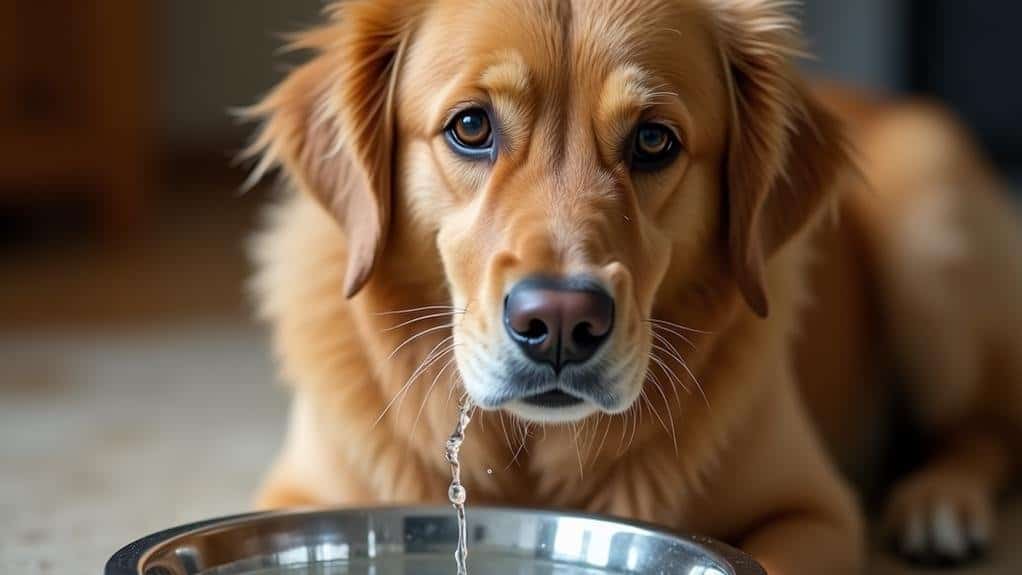
Distinguishing between normal and abnormal coughing in dogs can help you determine when to seek veterinary care. Occasional coughing after drinking water is typically harmless and may result from minor throat irritation or swallowing air.
However, it's essential to recognize when your dog's cough signals a more serious issue. Persistent coughing, especially when accompanied by symptoms like lethargy or loss of appetite, could indicate underlying health issues such as respiratory infections or tracheal problems.
Pay attention to the duration and frequency of your dog's coughing. While a single cough after drinking isn't concerning, frequent coughing warrants closer observation.
Monitor your dog's behavior and note any changes in coughing patterns. This information can be valuable for your veterinarian when evaluating potential health concerns.
If your dog's cough is accompanied by difficulty breathing or abnormal sounds, seek immediate veterinary evaluation. These signs may indicate more severe issues that require prompt attention.
Recognizing Kennel Cough Symptoms
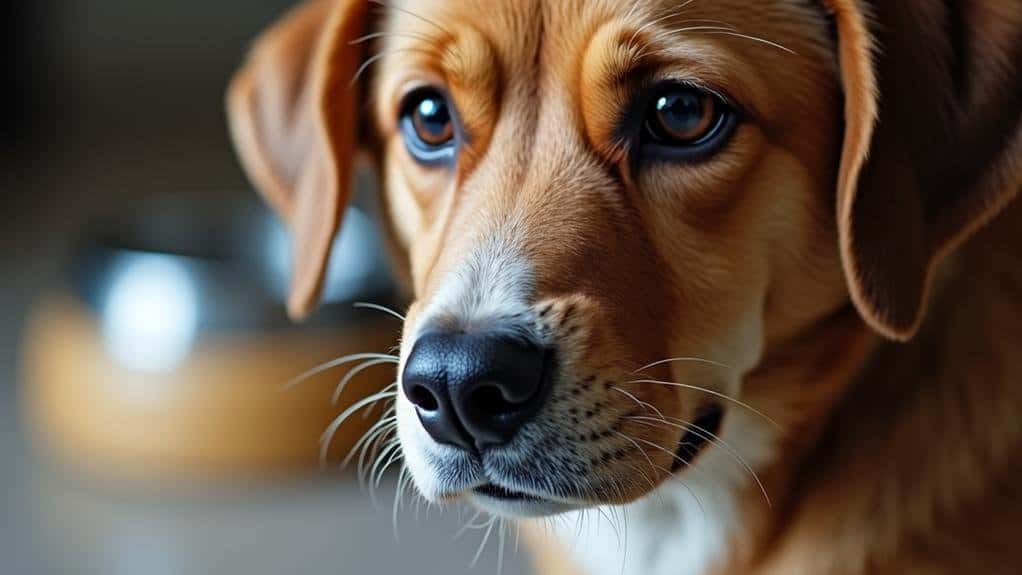
Recognizing kennel cough symptoms is essential for dog owners, as this highly contagious respiratory infection can spread rapidly among canines. If you notice your dog coughing after drinking water, it could be a sign of kennel cough. The most distinctive symptom is a persistent, dry cough that often sounds like honking, especially at night. You might also observe your dog retching or gagging due to throat irritation.
Keep an eye out for other signs of this respiratory illness, including nasal discharge, sneezing, lethargy, and loss of appetite. Your dog may develop a mild fever as well.
It's vital to remember that kennel cough is highly contagious and can quickly spread in crowded environments like dog parks or daycare facilities.
If you suspect your dog has kennel cough, seek veterinary care promptly. Your vet will likely perform a clinical examination and may recommend additional tests such as tracheal cytology, blood work, or X-rays to rule out pneumonia.
To prevent kennel cough, consider vaccinating your dog against Bordetella bronchiseptica, particularly if they're frequently exposed to other dogs in high-risk settings.
Tracheal Collapse in Dogs
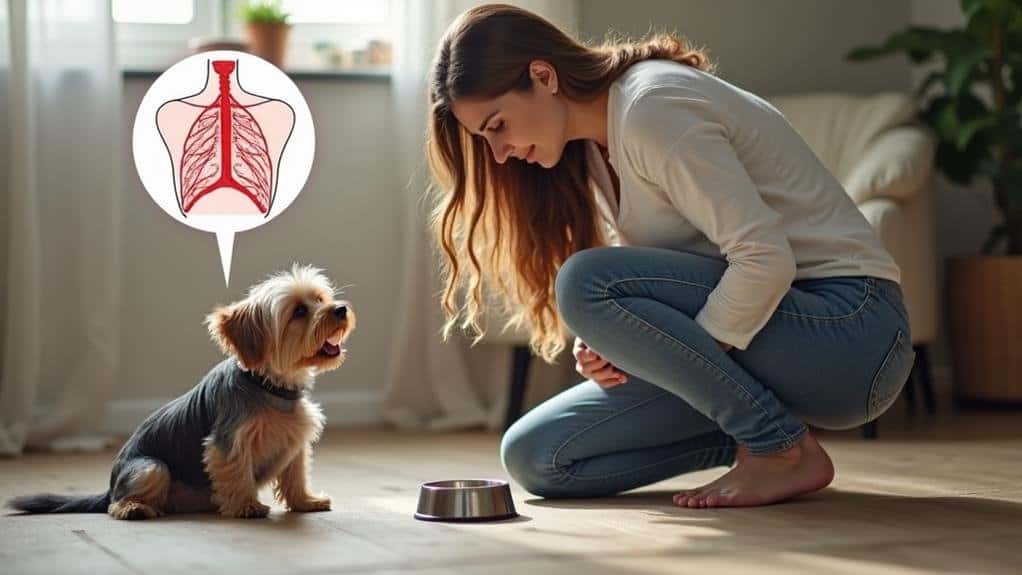
While kennel cough is a common cause of coughing in dogs, another condition that can lead to similar symptoms is tracheal collapse. This progressive disorder primarily affects small breed dogs, such as Yorkshire Terriers and Pomeranians, usually between 4 to 6 years of age.
If your dog coughs after drinking water or exhibits a distinctive honking cough during excitement or exercise, tracheal collapse might be the culprit.
Diagnosis involves physical examinations, X-rays, and possibly a bronchoscopy. To manage the condition, you'll need to focus on weight control and reducing environmental stressors. Your vet may prescribe cough suppressants and anti-inflammatory medications to alleviate symptoms.
In severe cases, surgery might be necessary to provide structural support to the weakened trachea.
It's essential to differentiate tracheal collapse from other respiratory infections, as treatment approaches vary. If you suspect your dog has tracheal collapse, consult your veterinarian promptly.
They'll help you develop appropriate management strategies to improve your pet's quality of life and minimize complications. Remember, early intervention and consistent care are key to managing this chronic condition effectively.
Allergies and Environmental Factors
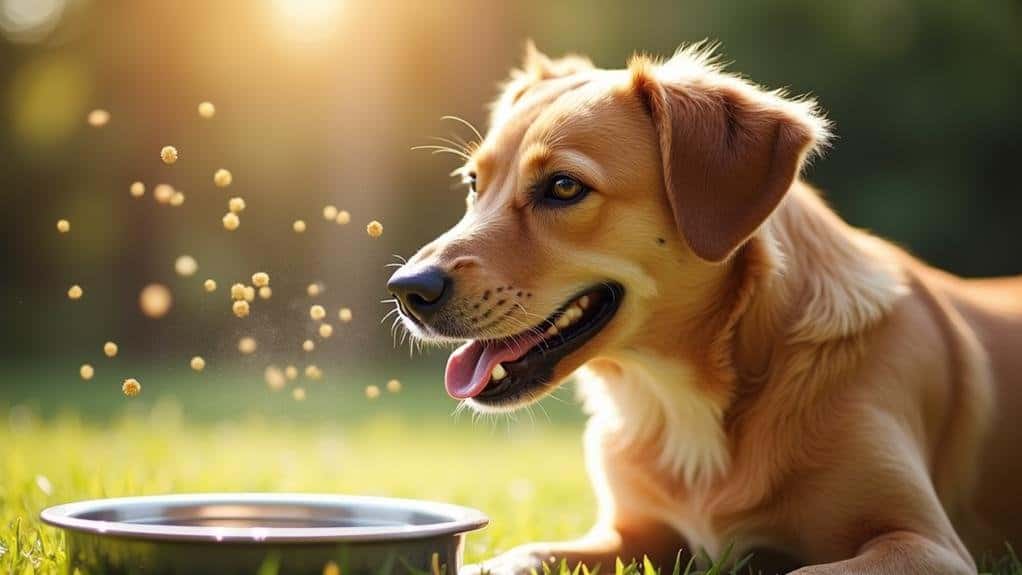
Canine allergies and environmental factors can play a vital role in your dog's coughing after drinking water. Allergies in dogs often lead to respiratory symptoms, including coughing, sneezing, and nasal discharge. When your pet drinks water, these symptoms may worsen due to throat irritation.
Common allergens like pollen, dust, and mold can trigger coughing in dogs. It's essential to identify and manage these triggers, especially during seasonal changes when allergens are more prevalent. You'll need to be extra vigilant in monitoring your dog's symptoms during these times.
Environmental factors, such as stressful environments, can exacerbate respiratory issues in dogs. This may lead to increased coughing episodes after drinking water, particularly in sensitive or anxious breeds. To help your pet, create a calm, allergen-free space and pay attention to their reactions in different settings.
Regular veterinary consultations are important for managing allergic reactions effectively. Your vet can help develop a tailored treatment plan, ensuring timely intervention and preventing chronic respiratory issues.
Prevention Strategies
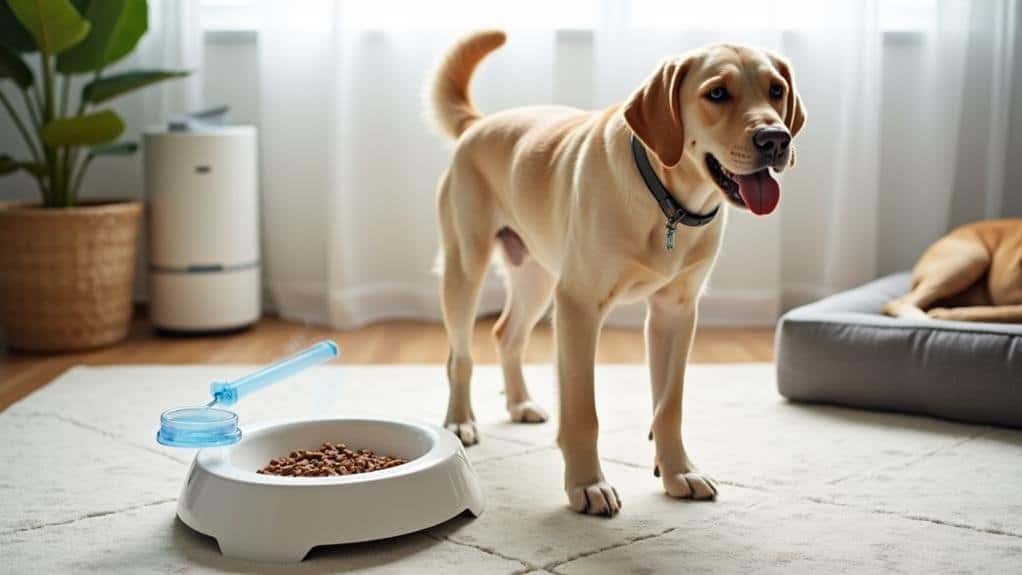
To prevent your dog from coughing after drinking water, you'll need to implement several practical strategies.
Start by offering your dog small amounts of water after exercise to prevent gulping, which can lead to coughing episodes. This is especially important for small dogs who may be more prone to rapid water consumption.
Utilize slow-feeder bowls for water to help regulate your dog's drinking pace. These bowls can greatly reduce the likelihood of coughing by encouraging slower, more controlled water intake.
Additionally, encourage your dog to take breaks during play or swimming to prevent excessive water ingestion.
Monitor your dog's drinking habits closely and intervene if you notice any signs of coughing. This vigilance can help you identify potential health issues early on.
Keep your dog's drinking area clean and free from contaminants to reduce the risk of respiratory infections, which can cause coughing after drinking.
Home Remedies and Care
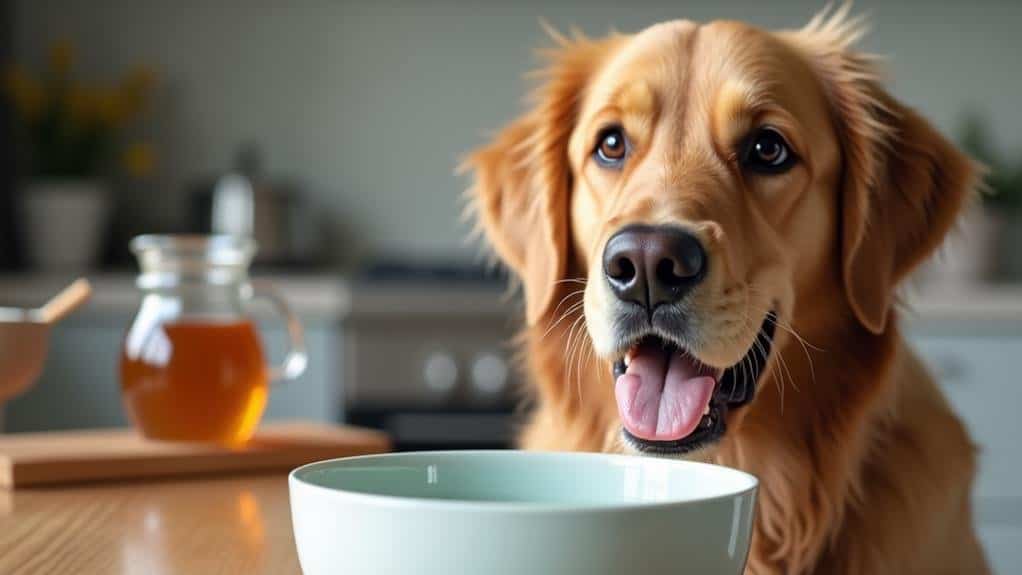
Home care strategies can considerably reduce your dog's coughing episodes after drinking water. To help your furry friend, encourage them to take small sips rather than gulping their water. This simple technique can prevent water from entering the trachea and causing coughs.
Consider using slow-feeder water bowls to regulate your dog's drinking pace, promoting better hydration without the risk of coughing fits.
Creating a comfortable environment for your dog is essential for their respiratory health. Here are four home remedies you can try:
- Use a humidifier to soothe your dog's throat and respiratory tract
- Isolate your coughing dog from other pets to prevent potential infections
- Monitor your dog's hydration levels and encourage measured drinking
- Clean water bowls regularly to prevent bacterial growth
When to Consult a Veterinarian
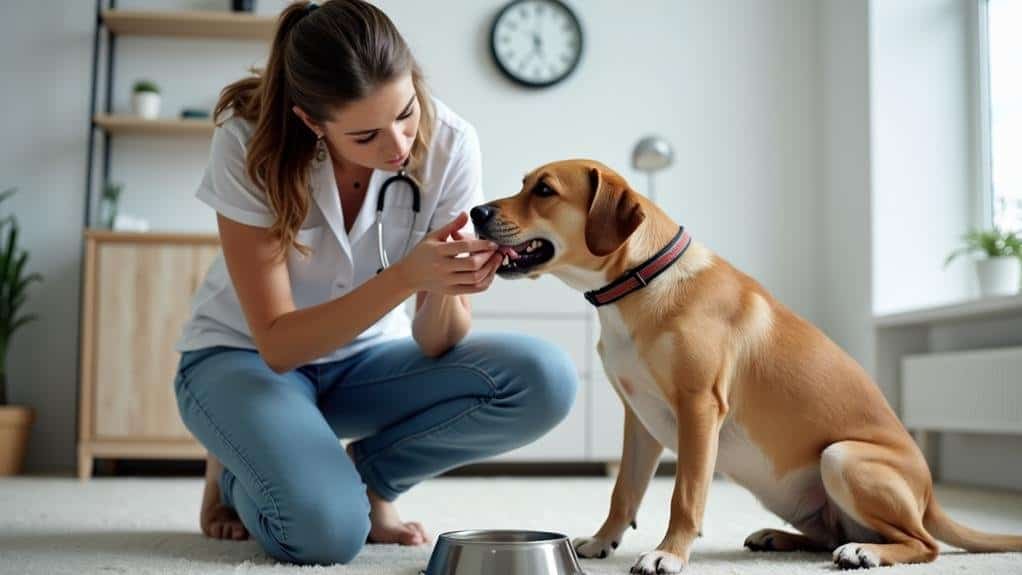
While home remedies can often alleviate minor coughing issues, it's vital to recognize when professional veterinary care is necessary. If your dog's coughing after drinking persists or worsens, it's time to consult a veterinarian. They can rule out underlying health issues such as tracheal problems or respiratory infections that may be causing the cough.
Pay close attention to your dog's behavior and symptoms. Persistent coughing accompanied by lethargy, difficulty breathing, or loss of appetite are signs of health problems that require immediate veterinary attention.
If you notice your dog choking or gagging while drinking, don't wait – seek urgent care to guarantee there's no airway obstruction.
To help your vet diagnose the issue, monitor your dog's coughing episodes, noting their frequency and duration. This information can be invaluable for determining the best course of treatment.
Long-Term Management Techniques
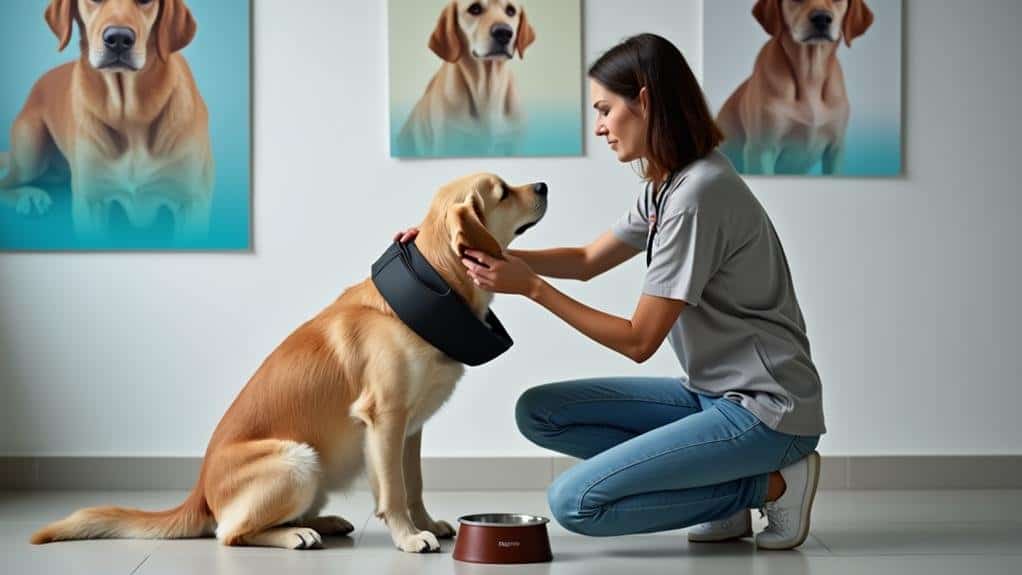
Effective long-term management of your dog's coughing after drinking water requires a multifaceted approach.
To minimize the risk of your furry friend experiencing coughs after drinking water, you'll need to implement several strategies that address both the immediate issue and potential underlying health conditions.
Consider incorporating these long-term management techniques:
- Use slow-feed bowls to regulate your dog's water intake, preventing rapid gulping that can lead to coughing episodes.
- Encourage breaks during drinking sessions, especially after exercise, to avoid irritating your dog's throat.
- Monitor your pet's hydration needs closely, ensuring access to fresh water while managing their drinking pace.
- Schedule regular veterinary check-ups to assess and address any underlying respiratory issues.
Frequently Asked Questions
Why Does My Dog Cough After Drinking Water Every Time?
Your dog's coughing after drinking water could be due to fast gulping, accidental inhalation, or breed-specific anatomy. If it happens every time, it might indicate underlying issues like tracheal problems or respiratory infections. You should consult a veterinarian for proper evaluation.
Why Is My Dog Coughing Like Something Is Stuck in His Throat?
Your dog's cough could indicate tracheal irritation or obstruction. It might be from drinking too fast or an underlying health issue. Watch for frequency and context of coughing episodes. If it persists, you should consult your vet.
What Causes Coughing After Drinking Water?
If your dog's coughing after drinking water, it's often due to gulping too quickly. They're likely inhaling some water into their airway, triggering a cough reflex. It can also be caused by throat irritation or underlying health issues.
Can Dogs Get Water in Their Lungs From Drinking Water?
Yes, your dog can get water in their lungs while drinking. It's more likely if they drink too quickly or gulp excessively. This can cause coughing as their body tries to expel the liquid, potentially leading to aspiration pneumonia.
Conclusion
You've learned why your dog might cough after drinking water and how to differentiate between normal and concerning symptoms. Remember, prevention is key, but if coughing persists, consult your vet. With proper care and management, you can help your furry friend stay comfortable and healthy. Keep an eye on their drinking habits, implement preventive measures, and don't hesitate to seek professional help when needed. Your dog's well-being is in your hands.

